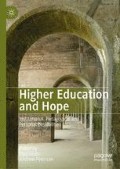Abstract
Although there has been considerable debate in contemporary literature on the erosion of public good in higher education, most of it has concentrated on the word ‘public’ in the phrase rather than on the notion of ‘good’. A focus on the ‘good’ is attempted here, and the distinctions between inherent, intrinsic and instrumental are used in a framework devised by Audi (The Good in the Right: A Theory of Intuition in Intrinsic Value. Princeton University Press, Princeton, 2004) to develop the following ideas: that education is inherently good; that aspects of its practice are feasibly intrinsically good; and the institutions in which the practice of higher education is delivered is contributive and thus of instrumental value. For if education is intrinsically good then it is something we can all hope for as a common good.
Access this chapter
Tax calculation will be finalised at checkout
Purchases are for personal use only
Notes
- 1.
A much fuller discussion can be found in Korsgaard’s Creating the Kingdom of Ends (1996) around a distinction between intrinsic and extrinsic values as distinct from instrumental and final value.
- 2.
The opposite, applying to bad values and uses.
- 3.
Nicomachean Ethics, 1097a, pp. 25–30.
- 4.
I have gone further elsewhere and argued that this stance ought to lead to one’s contentment and suggested that higher education can play a part in this.
- 5.
This raises issue of the right to education, which I will discuss in another section.
- 6.
Page numbers of the White Paper.
References
Aristotle. (1984). Nicomachean Ethics. In J. Barnes (Ed.), The Complete Works of Aristotle (pp. 729–1867). Princeton: Princeton University Press.
Audi, R. (2004). The Good in the Right: A Theory of Intuition in Intrinsic Value. Princeton: Princeton University Press.
Audi, R. (2006). Intrinsic Value and Reasons for Action. In T. Horgan & M. Timmons (Eds.), Metaethics After Moore (pp. 79–106). Oxford: Clarendon Press.
Audi, R. (2009). Moral Virtue and the Reasons for Action. Philosophical Issues,19(1), 1–20.
Carr, D. (2017). Virtue and Character in Higher Education. British Journal of Educational Studies,65(1), 109–124.
Clark, P. (2002). The Meaning of ‘Good’ and the Possibility of Value. Philosophical Studies,108, 31–38.
Department for Business, Innovation and Skills. (2016). Success as a Knowledge Economy: Teaching Excellence, Social Mobility and Student Choice. Higher Education White Paper. DBIS.
Freire, P. (2016). Pedagogy of Hope: Reliving Pedagogy of the Oppressed. London: Bloomsbury.
Griffin, J. (1988). Well-Being. Oxford: Clarendon Press.
Hager, P. (2011). Refurbishing MacIntyre’s Account of Practice. Journal of Philosophy of Education, 45(3), 545–561.
Jonathan, R. (1997). Educational ‘Goods’: Value and Benefit. Journal of Philosophy of Education,31(1), 59–82.
Kant, I. (1993). Grounding for the Metaphysics of Moral (J. E. Ellington, Trans.). London: Hackett.
Kant, I. (2005a). Religion and Rational Theology. Cambridge: Cambridge University Press.
Kant, I. (2005b). The Conflict of the Faculties. In Religion and Rational Theology (pp. 233–327). Cambridge: Cambridge University Press.
Kraut, R. (2011). Against Absolute Goodness. Oxford: Oxford University Press.
Lemos, N. M. (2009). Intrinsic Value: Concept and Warrant. Cambridge: Cambridge University Press.
Longden, B., & Bélanger, C. (2013). Universities: Public Good or Private Profit. Journal of Higher Education Policy and Management, 35(5), 501–522.
MacIntyre, A. (2007). After Virtue. London: Duckworth Publishers.
Marginson, S. (2011). Higher Education and Public Good. Higher Education Quarterly, 65(4), 411–433.
Moore, G. E. (2000). Principia Ethica. Cambridge: Cambridge University Press.
Moore, G. E. (2013). Ethics. New York: CreateSpace Independent Publishing Platform.
Nixon, J. (2012). Higher Education and the Public Good. London: Continuum International.
Nixon, J. (2017). Higher Education and the Public Good. In J. C. Shin & P. N. Teixeira (Eds.), International Encyclopedia of Higher Education Systems and Institutions (Section: Mass and Elite Higher Education in the 21st Century, M. Klemenčič, Ed.). Cham, Heidelberg, New York, Dordrecht, and London: Springer (Available Online).
Ozolin, T. T. (2013). R.S. Peters and J.H. Newman on the Aims of Education. Educational Philosophy and Theory, 45(2), 153–170.
Plato. (1997). Republic. In J. M. Cooper (Ed.), Plato the Complete Works (pp. 971–1223). London: Hackett.
Reid, A. (1998). The Value of Education. Journal of Philosophy of Education,32(3), 319–331.
Ross, D. (2002). The Right and the Good. Oxford: Oxford University Press.
Smith, R. (2003). Thinking With Each Other: The Peculiar Practice of the University. Journal of Philosophy of Education,37(2), 309–323.
Williams, J. (2016). A Critical Exploration of Changing Definitions of Public Good in Relation to Higher Education. Studies in Higher Education,41(4), 619–630.
Author information
Authors and Affiliations
Corresponding author
Editor information
Editors and Affiliations
Rights and permissions
Copyright information
© 2019 The Author(s)
About this chapter
Cite this chapter
Gibbs, P. (2019). Is Higher Education Inherently Good, Educative Practices Intrinsically Good and Universities Instrumentally Good? What Should We Hope For?. In: Gibbs, P., Peterson, A. (eds) Higher Education and Hope. Palgrave Macmillan, Cham. https://doi.org/10.1007/978-3-030-13566-9_11
Download citation
DOI: https://doi.org/10.1007/978-3-030-13566-9_11
Published:
Publisher Name: Palgrave Macmillan, Cham
Print ISBN: 978-3-030-13565-2
Online ISBN: 978-3-030-13566-9
eBook Packages: EducationEducation (R0)

